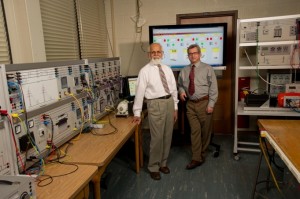
Starting this fall, the University at Buffalo and Buffalo State College will be working together on a new venture to provide green jobs training at both the undergraduate and graduate levels.
Coming off the heels of being awarded federal funding to turn a traditional electrical grid into a “smart grid,” the schools will be offering advanced coursework and training in smart grid technology and development. This collaboration builds on respective strengths and allows students to enroll in courses between campuses to access the technology that each school offers.
In offering this program, UB and Buffalo State endeavor to improve the quality of educational opportunities, increase graduate employment, and lower the cost of education and training.
“The laboratory and faculty resources available at any single institution are relatively small and are not by themselves sufficient to educate a required number of smart grid personnel, but when viewed as a united front, together they provide unparalleled capability and expertise,” said Mohammed Safiuddin, PhD, research professor emeritus of electrical engineering in the UB School of Engineering and Applied Sciences and UB principal investigator.
Safiuddin went on to say, “While this approach is contrary to the traditional model where each institution hoards its own resources, our institutions are committed to overcoming bureaucratic obstacles to help address the expected nationwide shortage of smart grid practitioners and developers.”
UB and Buffalo State (along with Clarkson University, the University at Rochester, and Onondaga Community College) are part of a larger consortium headed by Syracuse University that participates in the Department of Energy (DOE) Strategic Training and Education in Power Systems (STEPS) program. The courses provided by UB and Buffalo State will not only be available to their students and industry employees, but will also be provided on an online basis to the other schools in the consortium. Additionally, UB and Buffalo State students would be occasionally permitted to complete coursework or projects at other consortium facilities.
The smart grid laboratory will be housed at the Buffalo State campus for engineering students, however the facility has already received interest in its use by Esensors Inc., a UB startup company, for calibration of their newly developed Smart Power Meters.
“We need to address existing skills shortages and the aging workforce in the power industry. It is therefore critical that training of the current workforce and the education of a new cadre of power engineering professionals be addressed through a joint effort.” Said Safiuddin’s Buffalo State counterpart Ilya Grinberg, PhD, professor of technology and the Buffalo State principal investigator; he is also an adjunct professor of electrical engineering at UB.
“This approach optimizes the distributed nature of our faculty resources, with institutions complementing each other rather than duplicating the coursework,” said Grinberg. “To the best of my knowledge, this would be the first time that such a strategy will be followed using as many as six academic institutions, with tremendous flexibility and student choices, making the prospect of developing the new generation of smart grid engineers a reality rather than a dream.”

